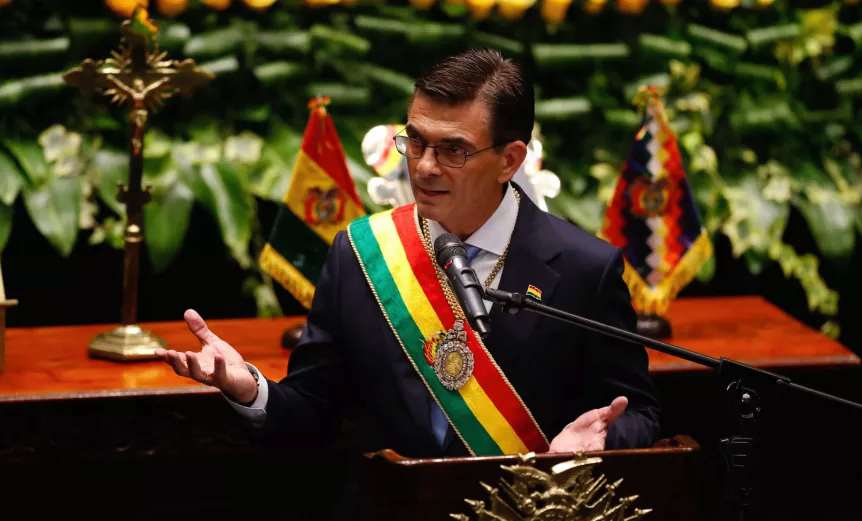In Bolivia, the political pendulum has swung gently from ideology toward pragmatism. Rodrigo Paz and his party (PDC) now embrace new labels: capitalism for all in economic policy; decentralization of power to the regions in politics; a renewed relationship with the United States in foreign affairs; a revival of the idea of the patria in symbolic terms; and center-right in ideological positioning. These signals from the new president suggest a transformation in public policy — though not necessarily in politics itself — after twenty years of statist left-wing rule and a monumental fuel crisis.
During the government of Jaime Paz Zamora (1989–1993), Rodrigo Paz’s father, Bolivia consolidated the neoliberal model launched in 1985, opening the market further and discouraging direct state intervention. Now, in 2025, under the slogan “capitalism for all,” Rodrigo Paz seeks to integrate informal sectors into the formal market through better credit conditions and to lower taxes and tariffs for formal sectors. Thirty years later, another Paz is once again betting on the strength of the market.

Decentralization of power to the regions is one of his central proposals. His “50/50” idea is a call for unity and shared responsibility — a framework for agreements among all autonomous authorities in the country: governors, mayors, and universities. As Paz himself has stated: “I don’t care which party they belong to. I want to respond to this 50/50: let’s look at health, education, and citizens’ security.” This is arguably one of his most radical proposals, challenging the extremely centralized structure left by the Plurinational State.
The idea of homeland as a symbolic cornerstone
The symbolic value of patria (homeland) in the new government’s narrative serves as an emotional resource to persuade citizens that it represents unity. Every power actor needs a label to project an image of purpose to the public — a way to mark a change of era. The patria has greater unifying potential than the current idea of the Plurinational State. Politics, after all, is a struggle to assign values, and the new government understands that.
Rodrigo Paz aims to build a new relationship between Bolivia and the United States while distancing himself from the governments of Venezuela, Nicaragua, and Cuba — none of which were invited to his inauguration. His focus is now on the capitalist North, and his administration is sending new geopolitical signals accordingly.
Bolivia shifts toward the center-right
Paz believes Bolivia needs balance and consensus, and that the political center represents reasonableness, moderation, and equilibrium. His vision rests on two pillars: prioritizing market forces and openly expressing his Christian faith. Although his campaign rhetoric leaned closer to the left, since winning the election he has gravitated toward the right, showing empathy for productive entrepreneurs — small, medium, and large — and distancing himself from social organizations co-opted by the MAS over two decades, which still defend statist social policies.
The new government promises to transform policies, not politics. It will likely focus on reforming norms and regulations to correct the economic situation inherited from the previous administration, without necessarily altering the structural ideological or institutional framework. For this, Paz must forge minimum agreements in the Legislative Assembly, relying on support from the second political force (LIBRE), led by Tuto Quiroga — who has already stated he won’t impose conditions — and consolidating his alliance with the third parliamentary force (UNIDAD), headed by Samuel Doria Medina. He must also manage or neutralize resistance from social organizations such as the Central Obrera Boliviana, which has already voiced disapproval of some of his pro-market proposals.
In summary, the pendulum has shifted from ideology to pragmatism because socioeconomic reality demands it. The new government is structurally constrained by the rules of the Plurinational framework, yet it could still shape a new political mindset and promote decisions that strengthen market forces while discouraging state capitalism — which has hindered business development and the generation of goods and services for citizens.
To succeed, Rodrigo Paz’s administration must first break with the policies of the past twenty years: anti-imperialism, the statist economic model, 21st-century socialism, the process of change, and the cultural revolution — none of which produced an effective state. Then, it must craft an alternative narrative that aligns with the aspirations of most Bolivians.
This is an opportune moment to begin changing Bolivia’s political mentality — a time for more effective politicians and fewer ideological actors.
*Machine translation, proofread by Ricardo Aceves.












